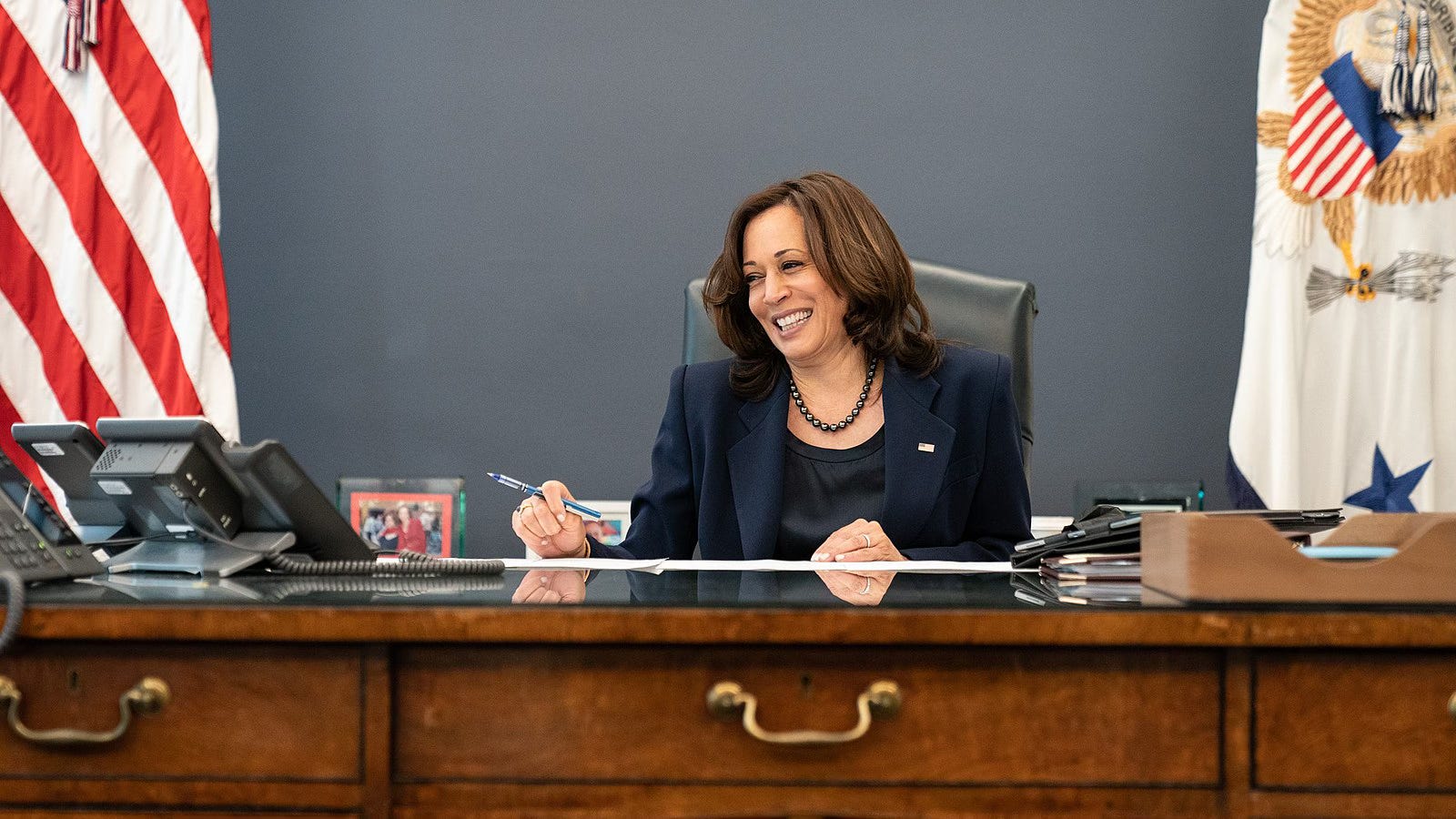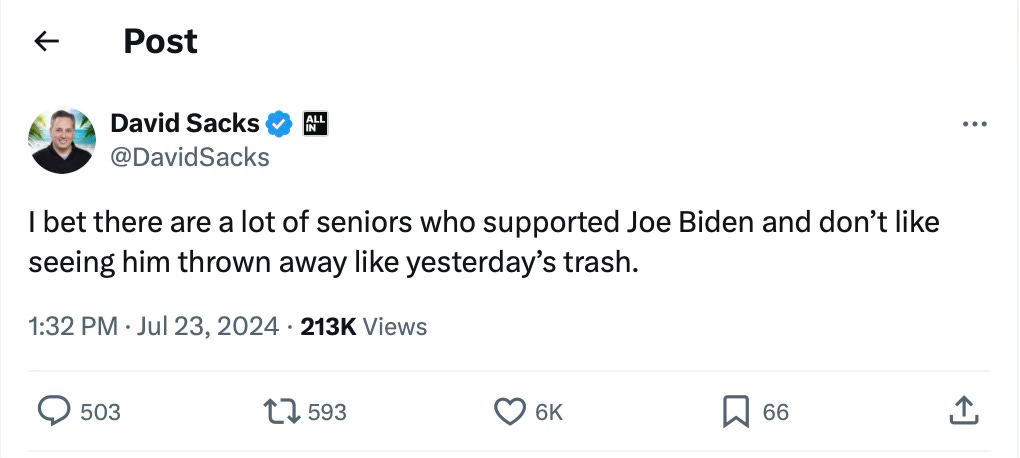But Kamala Harris Didn’t Win a Single Primary!
A look into how she could become the official Democratic Presidential nominee

Has the Democratic Party staged a coup against President Joe Biden? Is it reminiscent of the infamous Clinton emails from 2016 where the party derided the Bernie Sanders campaign?
And how could Kamala Harris become the Democratic nominee for President when she didn’t win a single primary? Sure, she was on the ticket that won, but only in her capacity as Vice President.
If you listen to conservative media or Elon Musk and his cronies on X, you may be led to think this is the antithesis of democracy; that Democrats are trying to overthrow the Republic and strip votes away from those who voted for Biden (not Harris!) in the primary. Or as the conservative commentator David Sacks called it: “elder abuse!”
Dave Portnoy of Barstool Sports fame (and infamy) even weighed in by accusing the Democratic Party of “hijacking democracy”; that they “stole the vote” from the American public because Kamala Harris didn’t run (let alone win) in a single primary.
If you read the comments to any of these conservative commentators (plus Dave Portnoy, who is admittedly harder to categorize), you would think we have a constitutional crisis on our hands. The mainstream media, for their part, has done little to explain how the primary and convention process works (it’s not an easy task).
So if you’re just listening to the two Daves here (Sacks and Portnoy), you might reasonably think that the Democrats are corrupt at worst and shady at best for replacing Harris with Biden.
As a lawyer who majored in political science and worked for a Congressman, I’m here to clear things up (hopefully). Let’s break down the primary and convention process, focusing on how presidential candidates are nominated against the backdrop of America’s rich history of contested conventions. It should shed light on the reality that what the Democrats are doing is far from anti-democratic, despite their (and the media’s) poor communication in explaining what’s happening.
The primary (and caucus) election process
I’ll keep this brief because frankly, the process bores most people, which is why commentators like Sacks can maliciously misinform (to push an agenda) and public figures like Portnoy have no clue how it actually works. It’s easy to ignore the inner workings because the American process of representative democracy is fairly complicated.
The primary process for various offices (including President) occurs in the months leading up to the election. It’s important to note that each party has its own rulebook and schedule (see the Democrats’ rules for reference), and both tend to change them year-to-year.
For example, the Biden team could be reasonably accused of “gaming” the Democratic process by changing the rules to start its primary season in South Carolina, a state that Biden was basically guaranteed to win. This put candidates like Dean Phillips at a distinct disadvantage and helped insulate Biden from any early primary challenge.
While the two parties have slightly different rules, their overall primary processes are similar:
Candidates announce their intention to run for office;
States run primary elections or caucuses where voters choose their preferred candidate;
Delegates are allocated to candidates based on the voting results; and
The candidate with the majority of delegates becomes the party’s nominee
All of this depends on local state election laws, which can widely differ. Some states, for example, use a caucus system where local gatherings select their preferred candidates.
So yes, all of this already happened for Joe Biden, which begs the question – how could Kamala Harris suddenly swoop in, take Biden’s delegates, and become the Democratic Party’s nominee?
The saving grace for the Democrats – something Republicans (and Trump particularly) may regret forever – was the early June debate. From a strategy perspective, it made no sense for Trump. He was gaining momentum already in the polls, with Silicon Valley donors lining up, Supreme Court cases going his way, and the Republican Convention was right around the corner (and who knew he was going to get shot!).
Biden needed the early debate more than Trump. For if something went awry, as it did, he would have time to drop out and let someone else take his place.
This issue of timing is important because each state has ballot rules that set deadlines for when political parties must declare their nominees. Ohio, for example, has an early August deadline, which is forcing the Democratic Party to host a “virtual” convention prior to the in-person one later in August.
Why do they need to host it virtually, you ask? Because the delegates must formally vote to nominate a candidate before each state’s ballot deadline to reasonably ensure the chosen candidate’s name appears on the ballot.
The delegates allocated to each candidate have one overarching requirement based on Democratic Convention rules (which is similar on the Republican side): “in all good conscience reflect the sentiments of those who elected them.”
Now imagine if Trump had refused to debate Biden until after the convention.
But because he debated Biden before, exposing Biden for what he had unfortunately become, the Democratic Party was able to say “bye Joe, thank you for your service” and move swiftly to replace him with the next person in line, Vice President Kamala Harris.
Political party conventions still legally matter even if they’re less dramatic in the modern era
Kamala Harris is not the Democratic Party nominee unless and until she is formally voted in by delegates as the nominee at the convention, virtual or otherwise. So even though Harris has the support - based on an AP Survey - of more than the 1,976 delegates required to win the nomination, it means nothing until it’s formalized.
Why does it mean nothing?
Delegates can change their vote!
Anyone who calls this process undemocratic, undermining the will of the people, or as Dave Portnoy put it, “hijacking democracy”, does not appreciate America’s rich history of contested political party conventions. Let alone the political party rules and local election laws.
On the first ballot at the convention, delegates are generally expected to vote for the candidate they were allocated to during the primary or caucus. The political party rules, however, allow for delegates to act as free agents should their allocated candidate withdraw, as Biden did.
Biden’s endorsement of Harris some twenty minutes after announcing his withdrawal certainly carried major weight, and his transfer of the huge campaign war chest (~$96 million at the end of June) gave her a major advantage, but Biden’s delegates are not legally tied to Harris. Biden did not “release” them to her, a concept that is more common in the Republican Party (although I’m skeptical this was the legitimate point of confusion for Republicans who took issue with the “hijacking of democracy”).
So if a competing candidate chose to challenge Harris ahead of the convention, they have the ability to do so. The threshold is not even that high – candidates only need the electronic signatures of 300 convention delegates.
Now, would competing candidates be at a major practical disadvantage given Biden’s campaign effectively swapped him out for her, practically gifting her the benefits of the entire campaign infrastructure and apparatus?
Of course.
But it does not mean it’s legally impossible. It’s just practically and politically unlikely.
In the unlikely event it does occur, however, let’s briefly review America’s rich history of contested (and nearly contested) conventions within the last century. Even if it doesn’t happen in 2024, it’s useful for understanding how America’s representative democracy operates, especially during the presidential election season.
Notable contested conventions in the past American century
The most recent (nearly) contested convention happened in 1980. Senator Ted Kennedy challenged incumbent President Jimmy Carter up to the Democratic Convention, but ultimately lost (some say this changed modern conventions forever, designing them less contentious).
Probably the most contentious convention in the past century occurred in 1924. A bitter fight between supporters of William G. McAdoo and Al Smith led to the nomination of John W. Davis. It required 103 ballots.
In 1952, the Democratic Convention drafted Adlai Stevenson as its nominee on the third ballot despite the fact he had not actively campaigned for the nomination.
In 1976, Ronald Reagan challenged incumbent President Gerald Ford, but Ford barely secured the nomination on the first ballot.
The point here is that delegates allocated to a specific candidate from a primary or caucus process are not necessarily required to stick to that candidate. Especially under certain circumstances such as a contested convention or a candidate withdrawing from the race. The flexibility is designed for the political party to achieve consensus and unite behind one candidate and platform.
But is the rise of Kamala Harris anti-democratic?
Kamala Harris did not run for President during the 2024 primaries and received no delegates in her capacity as a Presidential nominee. But none of that matters, legally speaking. As you saw from the brief history above, Adlai Stevenson didn’t even run for office in 1952, yet he was still selected as the Presidential nominee at the Democratic Convention.
So long as Democrats have nominated a presidential candidate before the end of their party’s convention, they’re good from a legal perspective. They will be able to reasonably ensure they have a candidate listed for the 2024 election in all 50 states, despite many Republican efforts to keep Democrats off the ballots.
It’s also likely legal for the large Biden campaign war chest to be transferred over to Harris. Her name was on the Presidential ticket (as Vice President) when the checks came in, so there are good arguments that the donations are still valid. Had a different candidate stepped in for Biden, this would have been more legally problematic (reimburse those donations!).
Regardless of whether it’s a Democrat or Republican candidate, however, nobody formally receives the nomination until the convention. So when Biden withdrew a few days ago, he was not technically the nominee. And as you saw from history, anything can happen in a convention, but we just haven’t witnessed it in modern history.
Some may try to argue that Kamala Harris’s rise is anti-democratic, but that contention completely ignores current election laws, both Democrat and Republican Party rules, and the recent history of contested conventions in America.
The better characterization of Kamala Harris’s rise is very democratic. It’s America’s constitutional republic working as intended; where informed delegates – trusted by voters and the party – must reach a consensus that achieves party unity.
The specific circumstances of President Biden’s withdrawal may be unprecedented, but the rules, laws, and history all account and allow for it.
Now we’ll have to wait and see if another unprecedented moment in history will occur this year: the first female President of the United States.
Read more over at The Political Prism!




